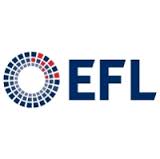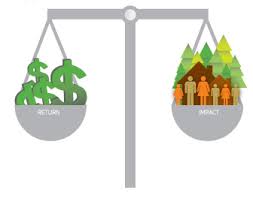What do college students at a place like Notre Dame have in common with the billions in emerging markets at the base of the economic pyramid?
Largely, they’re credit invisible. CFPB[1] estimates that over 45 million people in the US are essentially unscorable because the ingredients needed to understand risk aren’t available. Students and recent immigrants, not to mention those caught in the financial downturn, either have no borrowing history, or a blemished record which may not tell the whole story about someone’s potential to contribute to the economy.
 Our company, EFL – the Entrepreneurial Finance Lab, creates credit information about individuals using psychometrics, social network and phone behavior, and other widely available alternative data in emerging markets. Using this information, financial institutions have lent over a billion dollars and given more than half a million individuals access to finance.
Our company, EFL – the Entrepreneurial Finance Lab, creates credit information about individuals using psychometrics, social network and phone behavior, and other widely available alternative data in emerging markets. Using this information, financial institutions have lent over a billion dollars and given more than half a million individuals access to finance.
EFL was started with the belief that effectively matching capital and ideas enables human potential. In emerging markets, access to finance is severely constrained due to information asymmetry between borrowers and lenders. In other words – lacking the raw materials for understanding risk among individuals and small businesses, financial institutions don’t lend, individuals’ can’t grow their businesses or afford school fees, and entire nations’ economies are stunted.
EFL began as a research initiative at the Harvard Center for International Development in 2007 to determine how technology and non-traditional data about individuals could predict risk and opportunity among microfinance and SME (small and medium sized enterprises) borrowers in Latin America and Africa. Through existing research in the pre-employment screening space, combined with almost a decade of work in the field to create content and measure loan outcomes, EFL’s product has demonstrated the power of information in loosening the constraints to credit.
To date, EFL has enabled financial institutions to increase and improve access to credit across 4 continents and 2 dozen countries, doubling yearly. Along the way, we’ve learned some valuable lessons which might be helpful to folks pursuing a similar path:
Hard is a barrier to entry.
Like most startups, EFL’s path was more difficult, and took much longer than we’d planned. Banks aren’t designed to take risks and experiment, loan data takes ages to mature, and there’s been no fewer than 3 coups in the countries in which we operate along the way. But, we’ve found ourselves with a larger developing country footprint and dataset than the 3 biggest credit bureaus in the developed world. We’ve seen unparalleled growth and opportunity across Latin America, Africa and Asia, and firmly believe that the pace with which alternative data is being created means no credit decisions will be possible without it in the future. But we’ve also looked at some markets, for example Brazil, and determined that sometimes that difficulty isn’t worth it. Saying no is as important as saying yes when your survival is at stake.
Profit and impact can play nice. 
As we contemplated EFL’s structure, we made the decision to operate as a for-profit, despite our academic and development roots. In emerging markets awash with donor money, for-profit institutions (like our customers) are wary of foreign companies reliant on external funders and the whims of donors to determine their priorities. Paradoxically, our approach has attracted significant grant funding from organizations like the G-20, IFC, World Bank, and the Inter-American Development Bank, who view our collective missions as aligned in addressing financial inclusion. Aligning your mission with something that matters needn’t dictate how you’re structured to achieve success.
Impact and Mission matter.
Perhaps more than ever, people care about the purpose of their work. We’ve had happily-independent contractors ask us for permanent positions, employees leave and return, and have generally been able to recruit better talent than we could otherwise afford because of our impact driven mission. Not only does it make trans-pacific flights in middle seats more bearable, it makes financial sense, and creates a positive network effect among talented, motivated people in the organization. Do good work, inspire others, and they’ll want to evangelize for you.
Dennis [DJ] DiDonna is the Chief Strategy Officer at EFL. DJ helped lead the spin-out, launch, and international expansion of EFL, along with co-founder Bailey Klinger. A technology entrepreneur with a sales, management, and operations background, DJ has helped to grow operations and partnerships at EFL across four continents. DJ received his Bachelors in International Relations from the University of Notre Dame and a Masters in Business Administration from Harvard Business School.
[1] Consumer Finance Protection Bureau: https://www.lendup.com/blog/innovation-to-fix-problem-of-credit-invisibles.html


